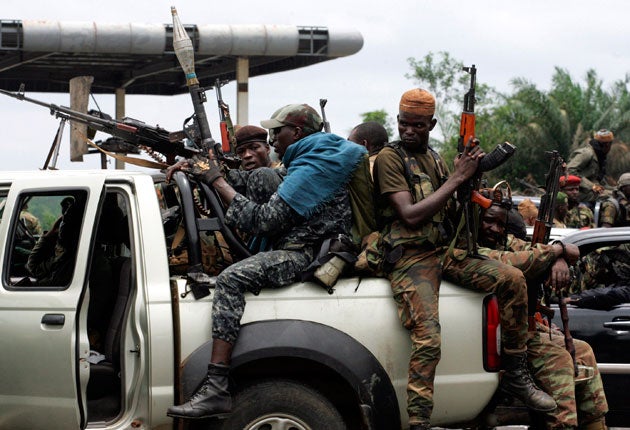Daniel Howden: In the ghost capital, it's best to walk with your hands in the air
View from Abidjan: The lucky few with a Western passport could be airlifted out by France, but most Ivorians have nowhere to go

Your support helps us to tell the story
From reproductive rights to climate change to Big Tech, The Independent is on the ground when the story is developing. Whether it's investigating the financials of Elon Musk's pro-Trump PAC or producing our latest documentary, 'The A Word', which shines a light on the American women fighting for reproductive rights, we know how important it is to parse out the facts from the messaging.
At such a critical moment in US history, we need reporters on the ground. Your donation allows us to keep sending journalists to speak to both sides of the story.
The Independent is trusted by Americans across the entire political spectrum. And unlike many other quality news outlets, we choose not to lock Americans out of our reporting and analysis with paywalls. We believe quality journalism should be available to everyone, paid for by those who can afford it.
Your support makes all the difference.The people emerge to reclaim the streets of the ghost city from first light. The safest time is between 7am and midday, but even then, they say, it's best to walk with your hands in the air.
"We are becoming more bold, people are tired of hiding in their houses," said Desire Kanon, an Ivorian television producer in the Cocody district of Abidjan. "They are coming out to look for food, for water and to see what is going on."
On seeing civilians, soldiers have been firing in the air to warn them to go back inside, he said. The fighting around Ivorian state television headquarters has been particularly savage, with the building changing hands twice since Friday and clouds of black smoke hanging in the air. "We've been hearing heavy weapons day and night," said Mr Kanon.
Further south in Abidjan a resident at the Novotel hotel, less than 500 metres from the presidential palace where Laurent Gbagbo is believed to be hiding, said that the area had been hit by frequent shelling. "We have been told to lie down on the floor if the hotel is hit and wait for the French to come and get us." Sure enough, a pro-Gbagbo militia stormed the building last night and took several people hostage.
UN staff and Western diplomats have been ordered not to leave their basements. But despite the escalating violence, four months of political crisis, shortages and now days of siege, most people have little choice but to venture into battlegrounds to look for the essentials. Water and electricity have been cut to many areas and precious few supplies have been getting through to the thousands of troops and rival militias whose roadblocks ring the city.
"This morning a couple of shops opened for the first time but the crowds were overwhelming," said Mr Kanon. "Most places have been looted, the rebels have been looting everywhere ... everything has become so expensive, something that used to cost one dollar now costs ten."
With up to one million people already displaced during the upsurge in fighting and border areas with neighbouring Liberia and Ghana choked with refugees, there are few good options for those left in the capital. The lucky few who have a Western passport have the prospect of a French-led evacuation, but tens of thousands of ordinary Ivorians have nowhere to go.
"If we were to flee, where would we go?" asked Mr Kanon. "Outside Abdijan things could be even worse. The only thing we can do is stay in our homes, lock the doors and lie down on the floor."
Join our commenting forum
Join thought-provoking conversations, follow other Independent readers and see their replies
Comments